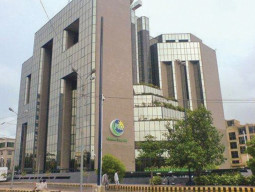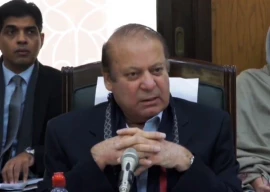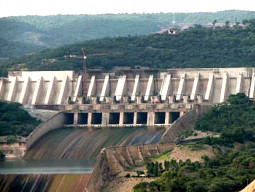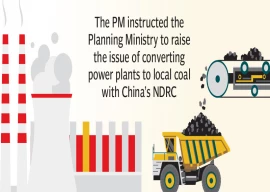
LAHORE:
Pakistan State Oil (PSO) does not expect the government to kick off its privatisation process anytime soon as the company has not got any clue so far despite the fact that it is on the current privatisation list, says the company’s managing director, Amjad Parvez Janjua.
“The biggest setback for the oil marketing company is the growing circular debt, which may haunt some future projects if it remains unsettled for a longer period,” Janjua said while speaking during a corporate briefing arranged by the Lahore Stock Exchange on Wednesday.

Investors were conscious of the growth the company notched up in the last fiscal year ended June 2014 and its future prospects where privatisation and circular debt were their key concerns.
According to details provided by the company, total receivables of PSO stand at Rs186 billion, of which Pakistan International Airlines (PIA) owes Rs10 billion. On the other hand, PSO has to pay Rs12 billion to refineries and has borrowed Rs106 billion from banks to bridge the deficit.
“It actually is a unilateral build-up not a circular debt, which has piled up, the situation today is much better than a couple of months ago as power producers have launched a joint effort in collaboration with us to clear the receivables,” Janjua said.
Also, the government has released some money and the company hopes that things will get better soon. However, “we cannot promise when this debt will be cleared as nobody is giving assurances.”
Janjua made it clear that according to an agreement reached with private power producers PSO was under no compulsion to supply oil on credit. In fact, the company should seek advance payments before making oil shipments, but for the sake of national interest it is bearing the burden.
“We purchase oil from our own sources and sell, in fact supply on credit to various sectors. We seek payment of all our receivables from the power sector and the government to streamline our operations.”
Earlier, PSO Deputy Managing Director Finance and IT Sohail Ahmad Butt stressed that from an investment point of view, this was the best time to pour money into PSO as its shares were undervalued.
In the domestic market, PSO’s share dropped to 62% in fiscal year 2013-14 compared to 64% in the previous year, but sales volumes increased 5%, Butt said.

The company recorded the highest-ever turnover of Rs1.4 trillion in 2013-14, a rise of 9% than the previous year. After-tax profit for the year stood at Rs21.8 billion, up 73%.
Market capitalisation of the company was Rs106 billion in 2013-14, up 34% year-on-year. It contributed Rs289 billion to the national coffers in the year, nearly 10% of the budget. With the surge in earnings, the company has entered the Rs100-billion club.
Published in The Express Tribune, September 18th, 2014.
Like Business on Facebook, follow @TribuneBiz on Twitter to stay informed and join in the conversation.
COMMENTS (1)
Comments are moderated and generally will be posted if they are on-topic and not abusive.
For more information, please see our Comments FAQ












































With a profit of 21 billion rupees how did it contribute 289 billion to the national exchequer?
A market cap of 100 billion rupees is 1 billion dollar. A company with a market cap lower than that is considered a small cap that most FIIs cannot invest in. Perhaps now they maybe able to invest in this company.
I am curious why a company which has defaulted multiple times and no international supplier is willing yo accept an LC from is considered to be cheap at a PE ratio of around 5?